Today’s Current Affairs: 23rd February 2023 for UPSC IAS exams, State PSC exams, SSC CGL, State SSC, RRB, Railways, Banking Exam & IBPS, etc
Table of Contents
Angel tax : Impact On Startups In India

A senior government official recently said that the ‘angel tax’ provision in the Finance Bill will not impact startups in India.
- The Finance Bill 2023 has proposed some changes that will remove the exemption for foreign funds and non-resident investors, who will now have to pay Angel Tax on the difference between capital raised and the fair value of securities sold.
- Angel Tax is levied on the capital raised via the issue of shares by unlisted companies from an Indian investor if the share price of issued shares is seen in excess of the fair market value of the company.
- The excess funds raised at prices above fair value is treated as income, on which tax is levied.
- It derives its genesis from section 56(2)(viib) of the Income Tax Act, 1961.
- It was introduced in 2012 to prevent black money laundering through share sales.
- The Angel Tax is levied at a rate of 30.9% on net investments in excess of the fair market value.
- In 2019, the Government announced an exemption from the Angel Tax for startups on fulfillment of certain conditions. These are,
- The startup should be recognized by the Department for Promotion of Industry and Internal Trade (DPIIT) as an eligible startup.
- The aggregate amount of paid-up share capital and share premium of the Startup cannot be more than ₹25 crores. This amount does not include the money raised from Non-Resident Indians (NRIs), Venture Capital Firms, and specified companies.
- For angel investors, the amount of investment that exceeds the fair market value can be claimed for a 100% tax exemption.
- However, the investor must have a net worth of ₹2 crores or an income of more than ₹25 Lakh in the past 3 fiscal years.
Train Control And Supervision System : Delhi Metro
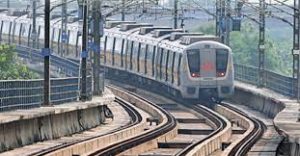
The Delhi Metro Rail Corporation (DMRC) recently launched the first ever indigenously developed Train Control and Supervision System.
- i-ATS system is India’s first indigenously developed Train Control and Supervision System.
- It is a computer-based system that will manage train operations including basic functioning such as running and halting.
- The i-ATS has been jointly developed by the DMRC and Bharat Electronics Limited (BEL) under the Government of India’s ‘Make in India’ and ‘AatmaNirbhar Bharat’ initiatives for Metro Rail Transit Systems.
- It will reduce the metro’s dependence on foreign vendors for metro operations.
- The i-ATS technology has been developed to be flexible enough to work with different signaling vendors’ systems with suitable changes.
- The development of i-ATS is a huge step forward in CBTC (Communication Based Train Control) based signaling system for the metro railways since the ATS is an essential component of the CBTC signaling system.
- With the launch of i-ATS, India became the sixth country with its own ATS products after France, Germany, Japan, Canada, and China.
First State In India To Have Organized Cultivation Of Mulethi : Himachal Pradesh

Himachal Pradesh has recently begun the commercial cultivation of licorice (Mulethi) to become the first state in India to have organized cultivation of Mulethi.
- Mulethi, commonly known as licorice, is a sweet-tasting perennial shrub.
- Scientific name: Glycyrrhiza glabra
- The roots have a sweet taste due to the presence of glycyrrhizin, which is 50 times sweeter than sucrose.
- It has been traditionally known and used as medicine in Ayurveda (known in Ayurveda as ‘Yashtimadhu’) for rejuvenation.
- Uses:
- Herbal medicines use Mulethi for its natural sweetness.
- It is also used in traditional medicines against chest and lung diseases.
- It is used to flavor candies, tobacco, and alcohol, artificial and natural sweeteners.
- It has anti-viral, anti-inflammatory, antioxidant, and anti-bacterial
- It is known to boost immunity due to the increase in the production of macrophage and lymphocytes.
- Mulethi herb can treat asthma, cough, cold, sore throat, and other respiratory ailments.
- It helps in weight loss as it contains flavonoids that help to reduce excessive fats accumulated in the body.
- It helps improve the digestive system, lessens the acidic level in the intestines, and also helps to detox our body.
ULTRASAT : Israel’s First Space Telescope Mission

NASA will launch Israel’s first space telescope mission, the Ultraviolet Transient Astronomy Satellite (ULTRASAT) in early 2026.
- ULTRASAT is an ultraviolet observatory with a large field of view, that will investigate the secrets of short-duration events in the universe, such as supernova explosions and mergers of neutron stars.
- It is planned to launch into a geostationary orbit around Earth
- NASA will provide the launch opportunity, Flight Payload Adapter, and other launch-related responsibilities for ULTRASAT
United Nations High Seas Treaty Began In New York:
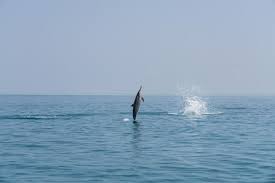
A new round of negotiations on the United Nations High Seas Treaty began in New York.
- United Nations High Seas Treaty is known as the ‘Paris Agreement for the Ocean’, and the treaty to deal with Biodiversity Beyond National Jurisdictionhas been under discussion for several years.
- The proposed treaty concerns the ocean existing beyond the Exclusive Economic Zones (EEZ) that lie from the coast of a country to about 200 nautical miles into the sea (Countries have special rights for exploration till 200 nautical miles).
- The treaty was to be negotiated under the United Nations Convention on Laws of the Sea (UNCLOS) of 1982.
- United Nations Convention on the Law of the Sea (UNCLOS) became effective on 16th November 1982.
- It superseded the four Geneva Conventions of April 1958, which respectively concerned the territorial sea and the contiguous zone, the continental shelf, the high seas, fishing and conservation of living resources on the high seas.
Pink Dolphin Rescued From a Colombian River:

Two pink river dolphins, a mother and her calf, were rescued from a Colombian river where these mammals were trapped in shallow water.
- Pink Dolphin is the Amazon River dolphin which is also known as the pink river dolphin or boto and lives only in freshwater.
- It is found throughout much of the Amazon and Orinoco river basins in Bolivia, Brazil, Colombia, Ecuador, Guyana, Peru, and Venezuela.
- The river dolphin is smaller than other types of saltwater dolphins, and the species has excellent hearing.
- Pink dolphins must live in warm, shallow water areas because they have very little blubber.
- Unlike ocean-dwelling dolphins, pink dolphins have a hump instead of a dorsal fin.
- Generally, these dolphins become more pink as they age, which has led to the species becoming known as the ‘pink dolphin.’
- These animal species use echolocation which lets the animal determine the size and shape of any surrounding item or object.
- Conservation status
- IUCN: Endangered
Gross Domestic Climate Risk Ranking:
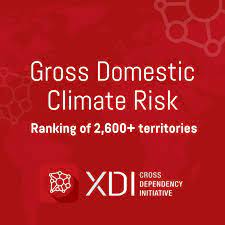
According to Gross Domestic Climate Risk ranking by Cross Dependency Initiative (XDI), India has nine states in the 50 high risk states including Punjab, Bihar, Uttar Pradesh, Maharashtra, Rajasthan, Tamil Nadu, Gujarat, Kerala and Assam.
- XDI is a global organisation specialising in climate risk analysis for regions, banks and companies.
- The index calculated the ‘Physical climate risk’ to built environments such as buildings and properties across 2,600 States and provinces globally in 2050.
- The index assigned an Aggregated Damage Ratio (ADR) to each region, which signifies the total amount of damage a region’s built environment would sustain in 2050. A high ADR signifies more peril.
Global Findings:
- According to report the vast majority (80%) of 50 provinces facing the highest climate risk to their physical infrastructure by 2050 are in China, the US, and India.
- Two of China’s largest sub-national economies – Jiangsu and Shandong – top the global ranking; followed by the U.S. which has 18 regions in the top 100 list.
- Asia dominates the list with 114 of the top 200 regions falling in the continent, including Pakistan, Indonesia and most South East Asian countries.
- Devastating flooding in 2022 affected 30% of the area of Pakistan and has partially or fully damaged more than 9 lac houses in Sindh province.
India Specific Findings:
- Under high emissions scenarios such as the Representative Concentration Pathway (RCP) 8.5 , high risk provinces will witness an average of 110% increase in damage risk by 2050.
- Currently, with 0.8 degrees rise in temperature, India’s 27 states and more than three-quarters of its districts are extreme event hotspots accounting for a 5% loss in GDP.
- If global warming is not limited to 2-degree thresholds, climate-vulnerable states in India will lose more than 10% of their gross state domestic product (GSDP).
- Bihar, Assam, and Tamil Nadu had the highest ADR among other Indian States. Assam, in particular, would witness the maximum increase of climate risk: rising up to 330% by 2050.
- Assam has witnessed an experienced exponential increase in flood events since 2011, and it had 15 of India’s 25 districts most vulnerable to climate change.
- 11 of the 36 districts in Maharashtra were found to be “highly vulnerable” to extreme weather events, droughts and dwindling water security.
Special Rupee Vostro Accounts:

20 Russian banks have opened Special Rupee Vostro Accounts (SRVA) with partner banks in India for the settlement of payments in rupee for trade between India and Russia.
- Also, all major domestic banks have listed their nodal officers to sort out issues faced by exporters under the arrangement.
- In July 2022, the RBI had unveiled a mechanism to settle international transactions in rupee to promote the growth of global trade, with emphasis on exports from India, as well as pushing rupee as an international currency.
- It is also expected to enable trade with sanction-hit nations such as Russia.
- According to the mechanism finalized by the RBI, banks of partner countries can approach authorized dealer banks in India for opening special rupee vostro accounts. The authorized dealer bank will then have to seek approval from the central bank with details of such an arrangement.
Vostro account:
- A vostro account is an account that domestic banks hold for foreign banks in the former’s domestic currency, in this case, the rupee.
- Domestic banks use it to provide international banking services to their clients who have global banking needs.
- The SRVA is an additional arrangement to the existing system that uses Freely convertible currencies and works as a complimentary system.
- The existing systems require maintaining balances and position in such currencies like US dollar and pound to facilitate trade.
Nostro Account:
- A Nostro account is an account held by a bank in another bank.
- It allows the customers to deposit money in the bank’s account in another bank.
- It is often used if a bank has no branches in a foreign country.
International Mother Language Day 2023:
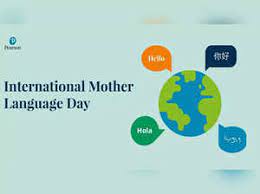
UNESCO declared 21st February as International Mother Language Day in 1999 and the World has been celebrating the same since 2000.
- The day also commemorates a long struggle by Bangladesh to protect its mother language Bangla.
- The resolution to mark 21st February as the International Mother Language Day was suggested by Rafiqul Islam, a Bangladeshi living in Canada.
- The theme of 2023 is “Multilingual education – a necessity to transform education”.
- UNESCO has emphasised the importance of mother-tongue-based education for the preservation of linguistic heritage, and the International Decade of Indigenous Languages has been initiated to safeguard cultural diversity.
Announcement Of Opportunity : ISRO
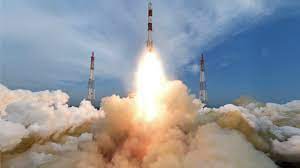
The Indian Space Research Organisation (ISRO) has recently made an Announcement of Opportunity (AO) to allow scientists and researchers to analyze data from the first dedicated Indian astronomy mission, AstroSat.
- The space agency has made the AO soliciting proposals for 13th AO cycle observations from AstroSat.
- This AO soliciting proposal for the Thirteenth AO cycle is for Indian as well as international proposers as Principal Investigators (PIs) to utilise AstroSat observatory time.
- The observations will be carried out between October 2023 to September 2024.
- This announcement is open to Indian scientists, researchers residing and working at institutes, universities and colleges in India for 55% of observing time and to non-Indian scientists, researchers, Non-Resident Indians (NRIs), working at space agencies, institutes, universities and colleges around the globe for 20% of observing time.
AstroSat:
- It is India’s first dedicated multi-wavelength space observatory.
- It is the first dedicated Indian astronomy mission aimed at studying celestial sources in X-ray, optical, and UV spectral bands simultaneously.
- AstroSat, with a lift-off mass of 1515 kg, was launched by the Indian launch vehicle PSLV from Satish Dhawan Space Centre, Sriharikota, on September 28, 2015, into a 650 km orbit inclined at an angle of 6 degrees to the equator.
- The spacecraft control center at Mission Operations Complex (MOX) of ISRO Telemetry, Tracking and Command Network (ISTRAC), Bengaluru, manages the satellite during its entire mission life.
UPI Pay Linkages:

India’s Unified Payments Interface (UPI) and Singapore’s PayNow have been integrated to enable faster Remittances between the two countries.
- Singapore has become the first country with which cross-border Person to Person (P2P) payment facilities have been launched.
- The UPI-PayNow partnership marks the world’s first to feature cloud-based infrastructure and participation by non-bank financial institutions.
- Linkage:
- With this facility, funds held in bank accounts or e-wallets can be transferred to /from India using just the UPI ID, mobile number, or VPA.
- This facility will eliminate the need for entering the details of beneficiaries, such as bank account numbers, bank codes etc.
UPI:
- UPI is India’s mobile-based fast payment system, which facilitates customers to make round-the-clock payments instantly, using a Virtual Payment Address (VPA) created by the customer.
- VPA is a unique identifier assigned to an individual to facilitate the transfer of funds through a digital payments system.
- It is a user-created identifier that can be used instead of providing sensitive bank account details while making payments.
- It eliminates the risk of sharing bank account details by the remitter. UPI supports both Person-to-Person (P2P) and Person-to-Merchant (P2M) payments and it also enables a user to send or receive money.
PayNow:
- PayNow is a fast payment system in Singapore. It enables peer-to-peer funds transfer service, available to retail customers through participating banks and Non-Bank Financial Institutions (NFIs) in Singapore.
- It allows users to send and receive instant funds from one bank or e-wallet account to another in Singapore by using just their mobile number, Singapore National Registration Identity Card (NRIC)/Foreign Identification Number (FIN), or VPA.
HD-3385 : New Wheat Variety
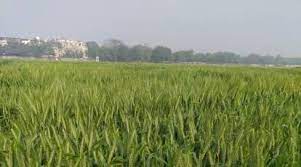
Scientist from Indian Agricultural Research Institute (IARI) has recently developed a New wheat variety HD-3385.
- HD-3385: It is the third HD variant wheat variety which looks most promising.
- With the same yields as HD-3410, plant height of just 95 cm and strong stems.
- It is the least lodging-prone and most amenable for early sowing.
- This variety, sown this time at IARI’s trial fields on October 22, has reached the pollination stage.
- IARI has registered HD-3385 with the Protection of Plant Varieties and Farmers’ Rights Authority (PPVFRA).
- The Govt. of India enacted “The Protection of Plant Varieties and Farmers’ Rights (PPV&FR) Act, 2001”.
- To implement the provisions of the Act the Ministry of Agriculture and Farmers Welfare established the Protection of Plant Varieties and Farmers’ Rights Authority in 2005.
- The Chairperson is the Chief Executive of the Authority.
- Besides the Chairperson, the Authority has 15 members.
Working Mechanism For Consultation And Coordination meeting : India And China

India and China recently held the Working Mechanism for Consultation and Coordination meeting.
- The 26th meeting of the Working Mechanism for Consultation and Coordination on India-China Border Affairs (WMCC) was held in Beijing on Wednesday.
- This was the first in-person WMCC meeting since the 14th meeting held in July 2019.
- The WMCC was established in 2012 to provide a platform for consultations and coordination between India and China on border affairs.
- The 26th meeting was significant as it took place amid ongoing tensions between the two countries, particularly in the wake of the 2020 clashes in the Galwan Valley.
- The meeting held:
- To bring back normalcy in the bilateral relations between India and China
- To restore peace along the Line of Actual Control
India To Setup Digital University:

The Minister of Skill Development Shri Dharmendra Pradhan recently announced that India will soon set up Digital University. The main objective of establishing a Digital University is to reduce the cost of higher education.
- The digital university is seen as a major step towards better employability through programmes in emerging areas and attaining 50% gross enrolment ration (GER) in higher education by 2030, as envisaged in the National Education Policy, 2020.
- The digital university will start its operations in the next academic session with certificate and diploma programmes and offer degree courses subsequently.
- As per the university’s planned architecture, TOI has learnt, the digital content would be hosted on the Study Webs of Active-Learning for Young Aspiring Minds (SWAYAM) platform.
- At the same time, the technology and administrative delivery will be entrusted to the Samarth platform, aimed at building digital campuses, which provide effortless and democratic delivery of educational services.
New Chief Of Shiv Sena : Eknath Shinde
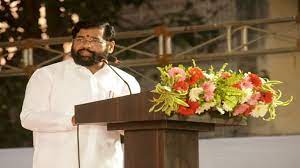
Eknath Shinde’s anointment as the new Sena chief comes a day before the Supreme Court is set to hear a plea by the Uddhav Thackeray faction to restrain Shinde from taking control of Sena’s properties and finances.
- Maharashtra chief minister Eknath Shinde was named as the new Shiv Sena president at the party’s national executive meeting in Mumbai.
- It was the first national executive meeting after the Election Commission of India (ECI) recognised his faction as the real Shiv Sena and allocated the ‘bow and arrow’ symbol to him.
- Shinde’s anointment as the new Sena chief comes a day before the Supreme Court is set to hear a plea by the Uddhav Thackeray faction to restrain Shinde from taking control of Sena’s properties and finances.
- The two factions have also been battling over control of offices.
- The Shinde faction MLAs took charge of the Shiv Sena office in the Maharashtra Assembly.
- The Lok Sabha secretariat has said that the Sena office in the Parliament building in New Delhi had been allotted to the Shinde camp.




